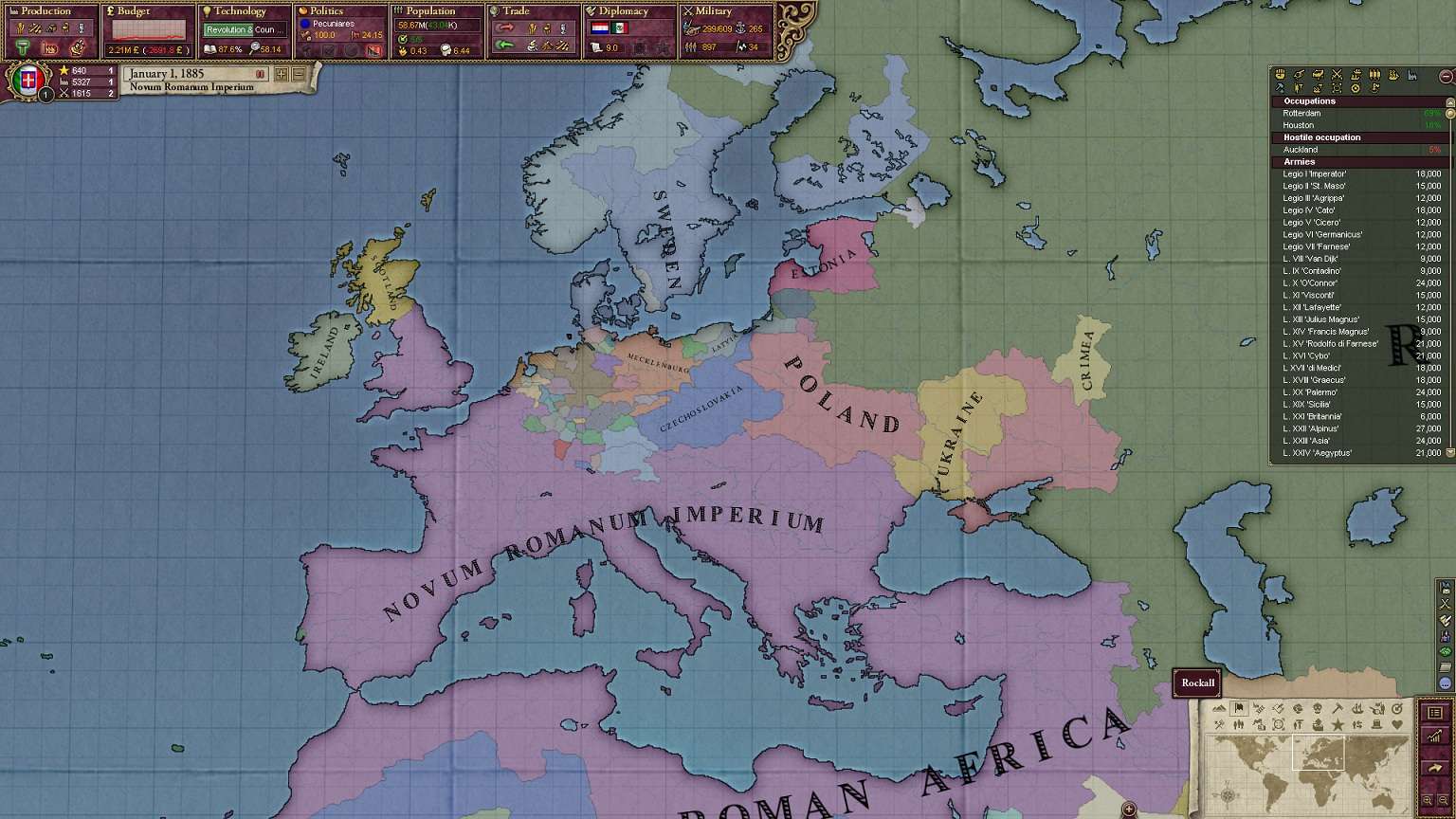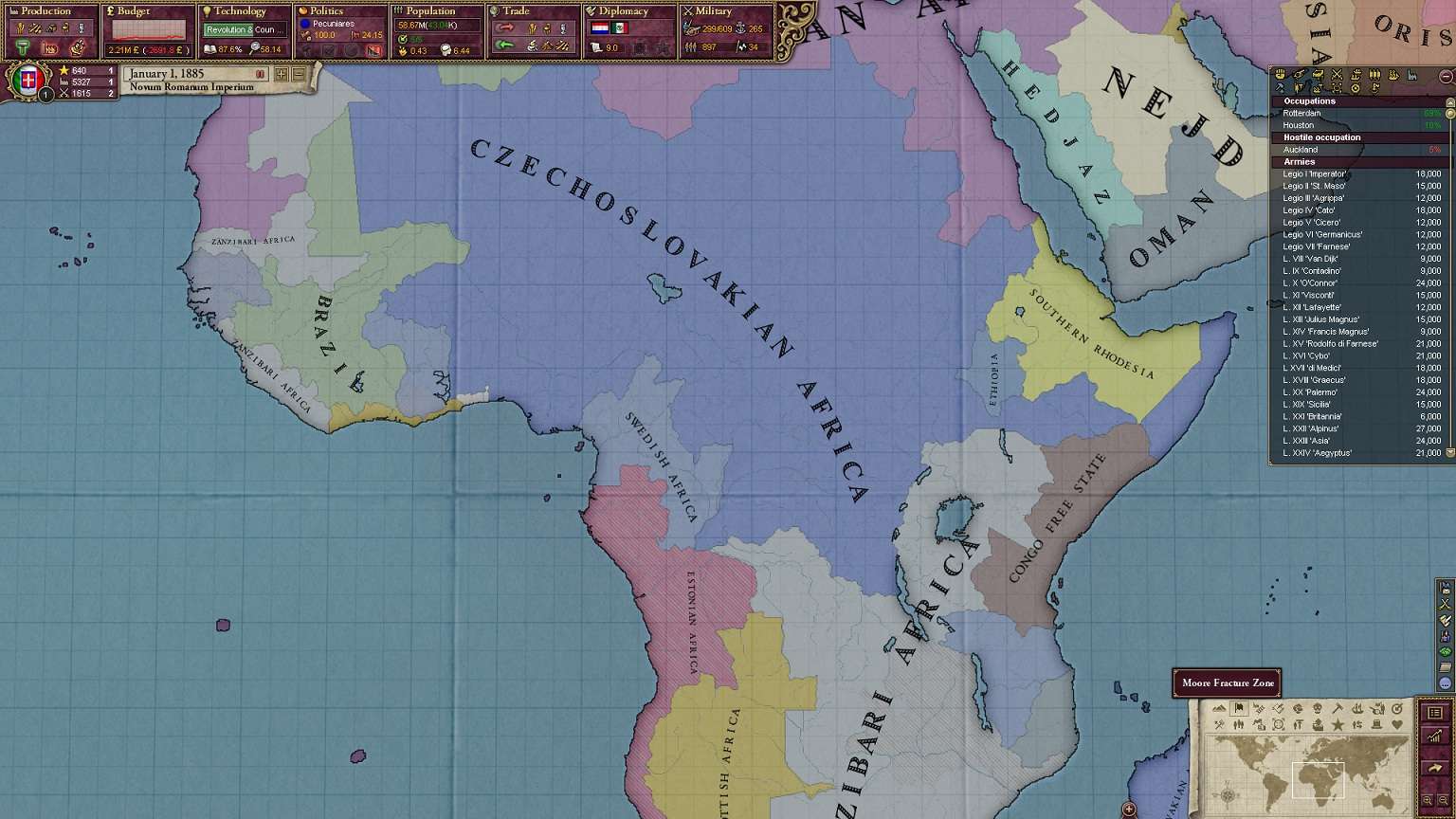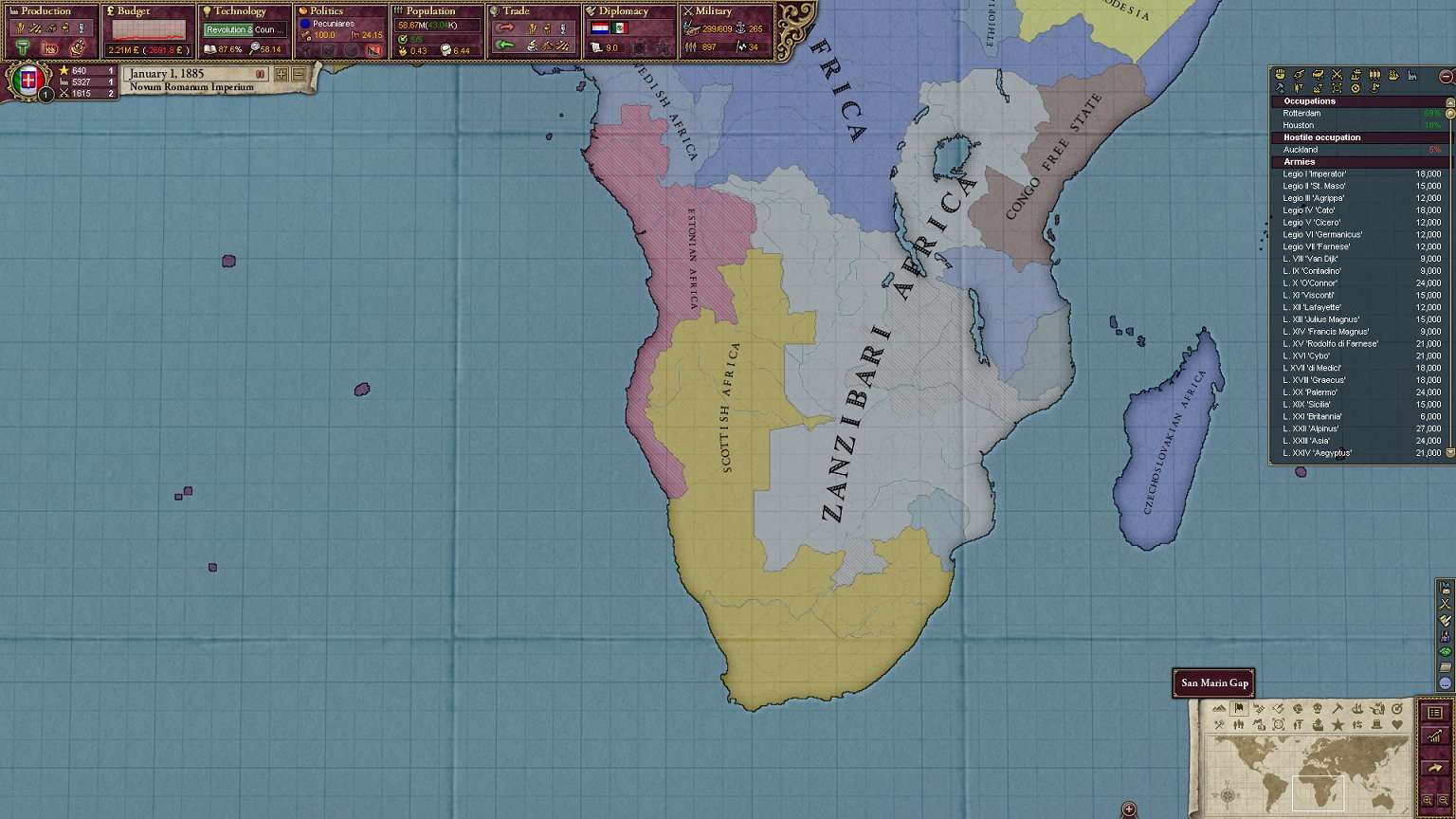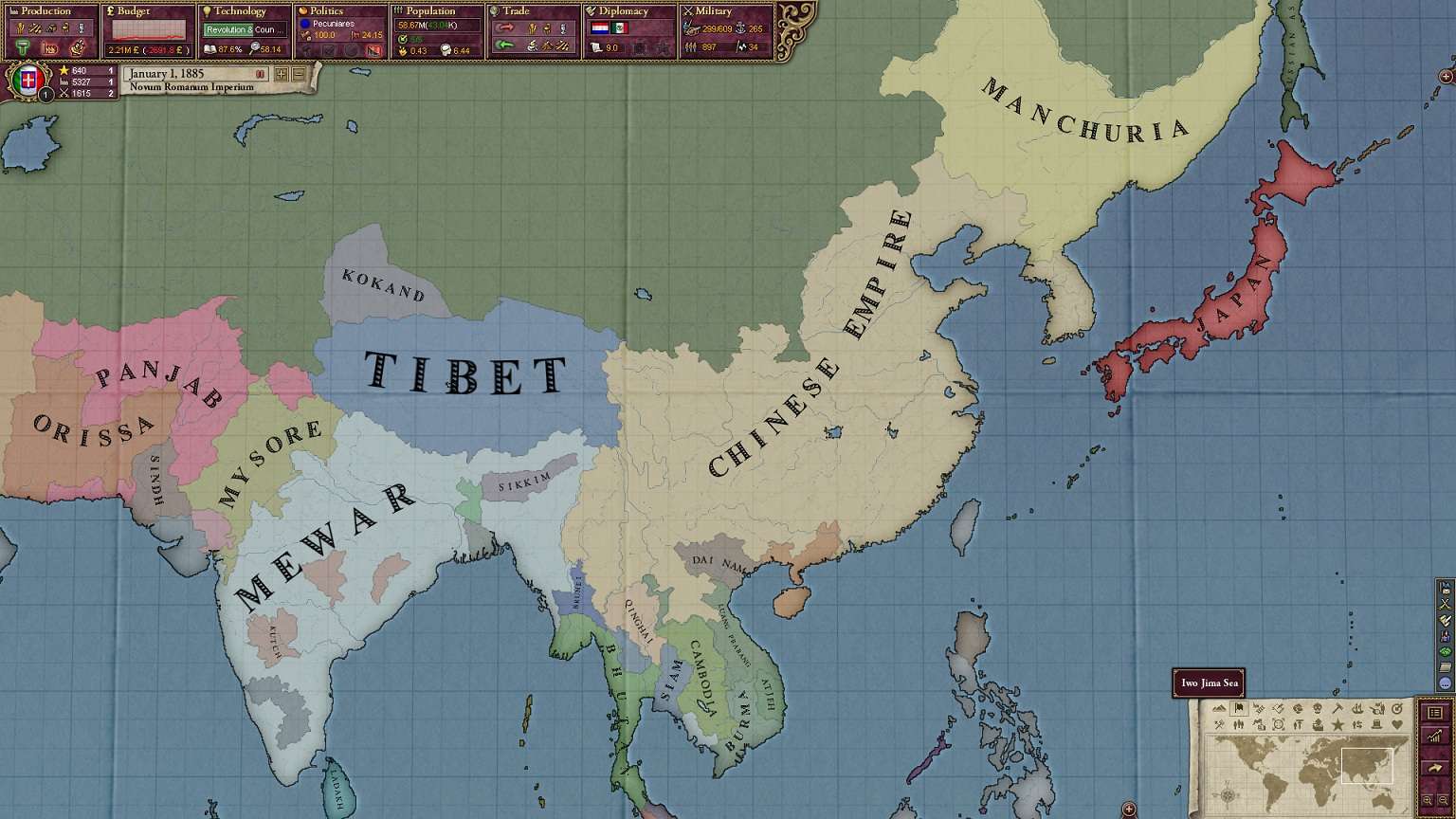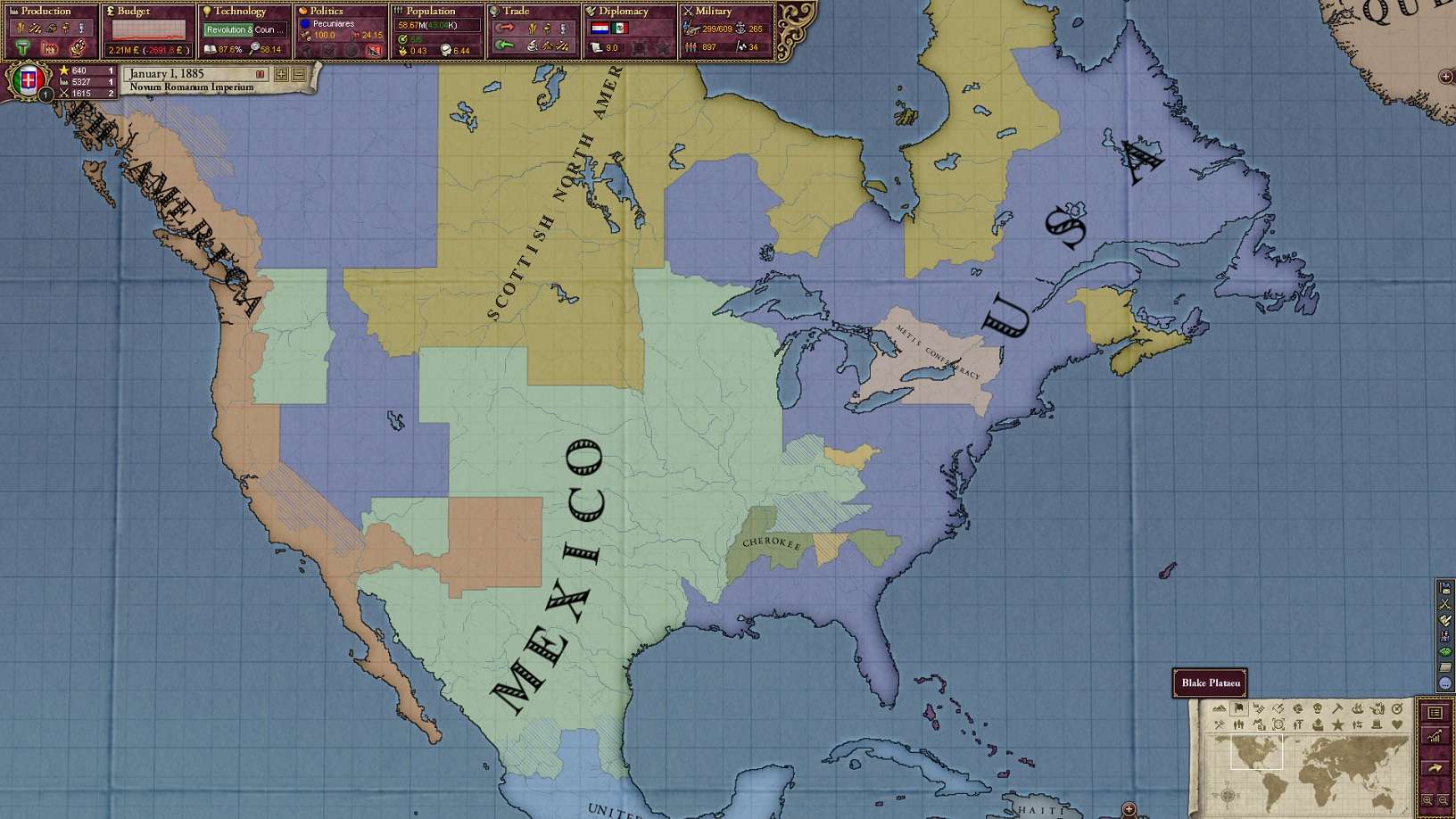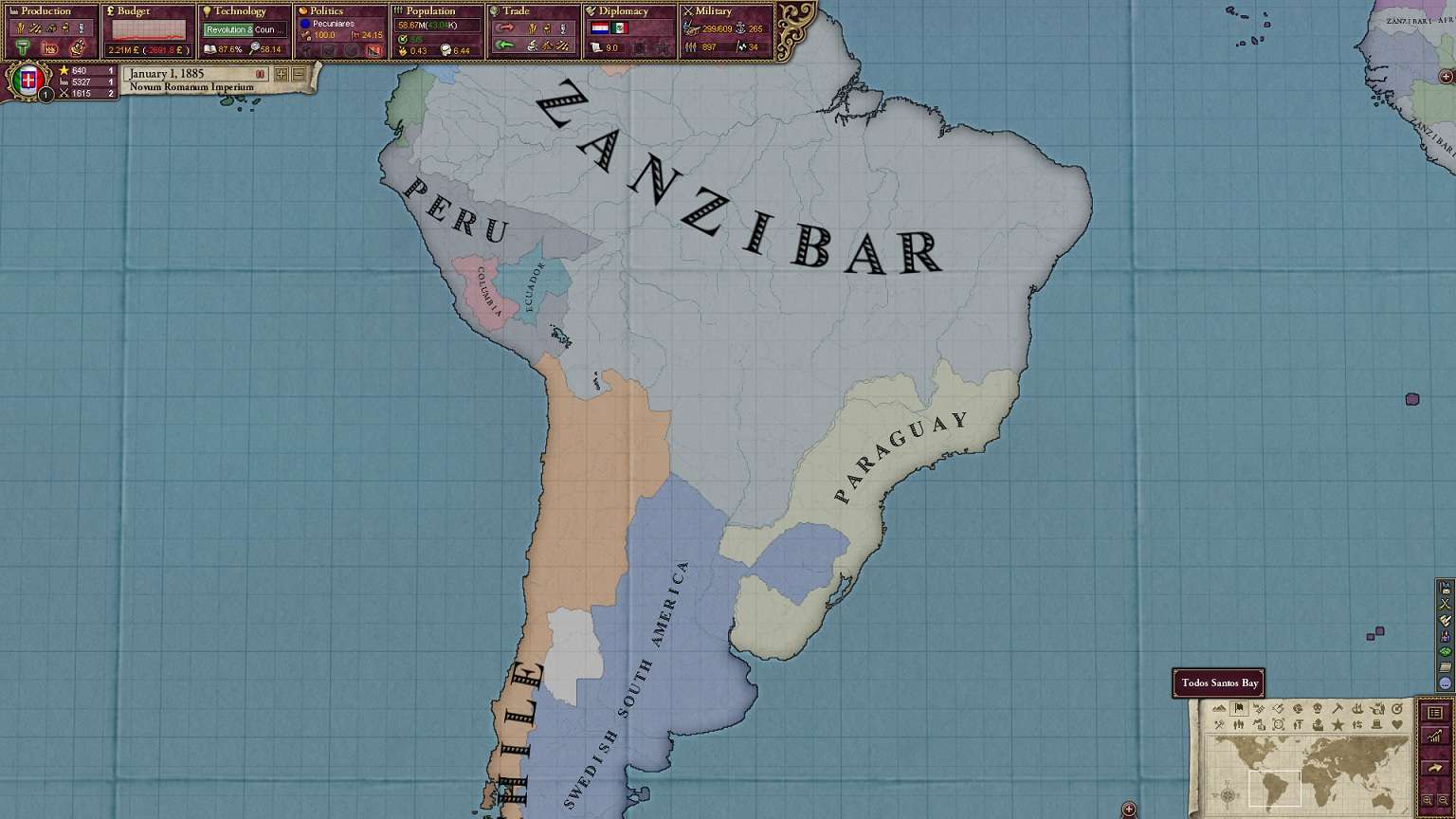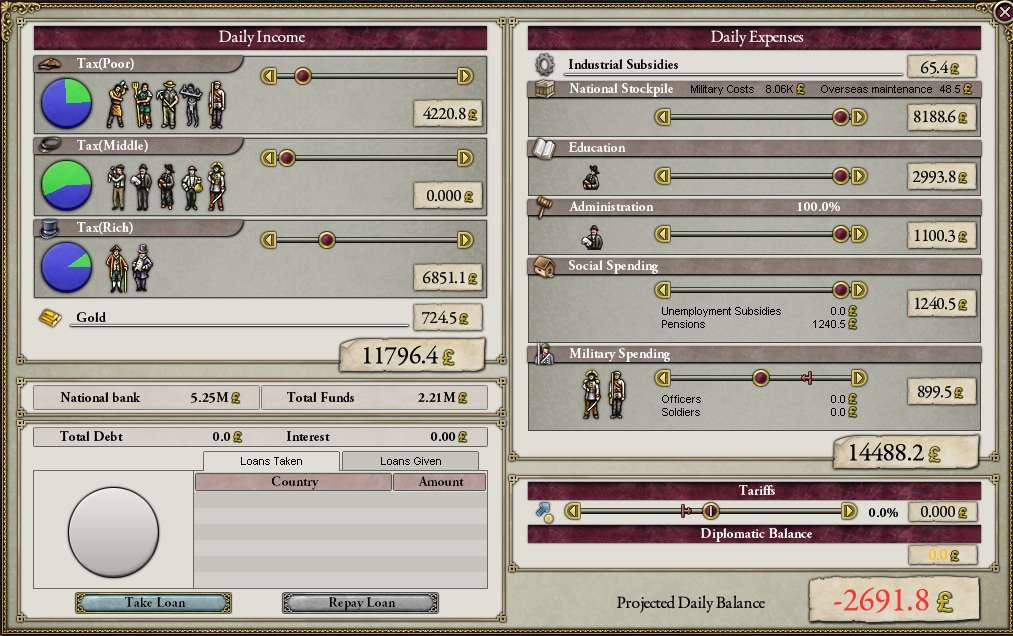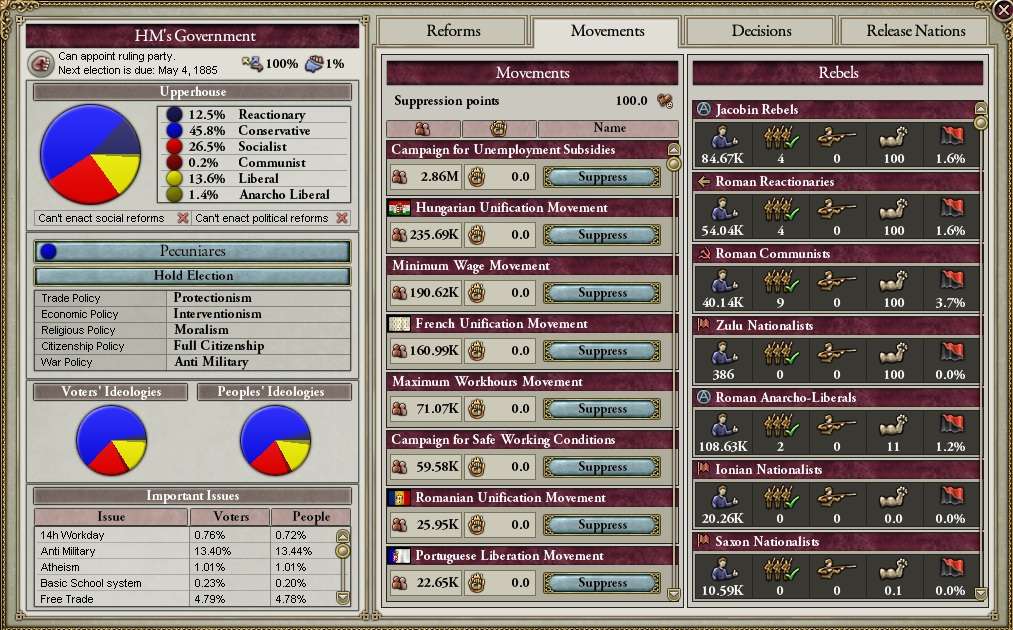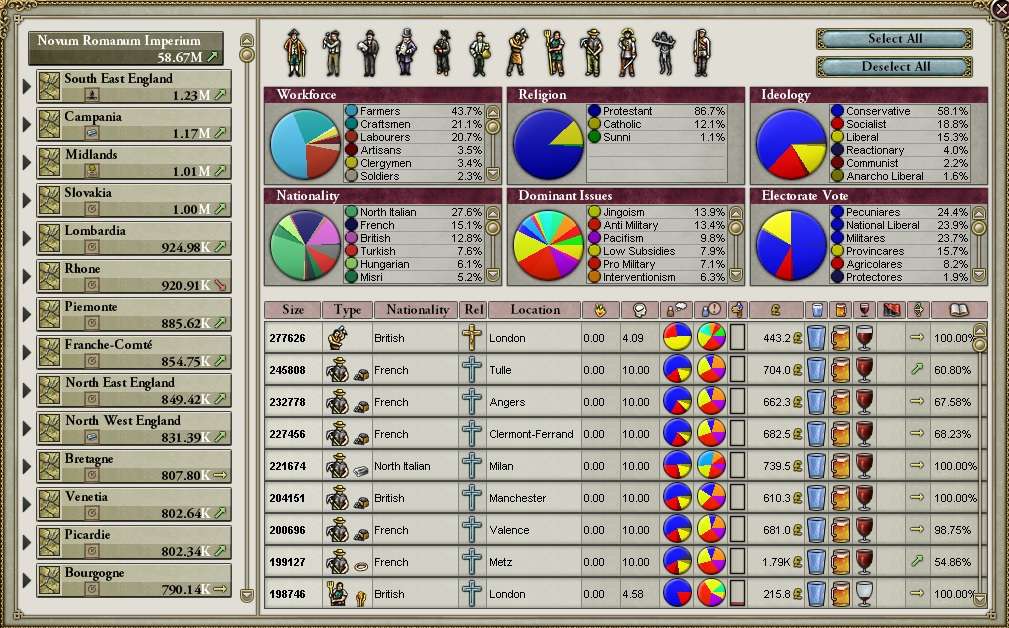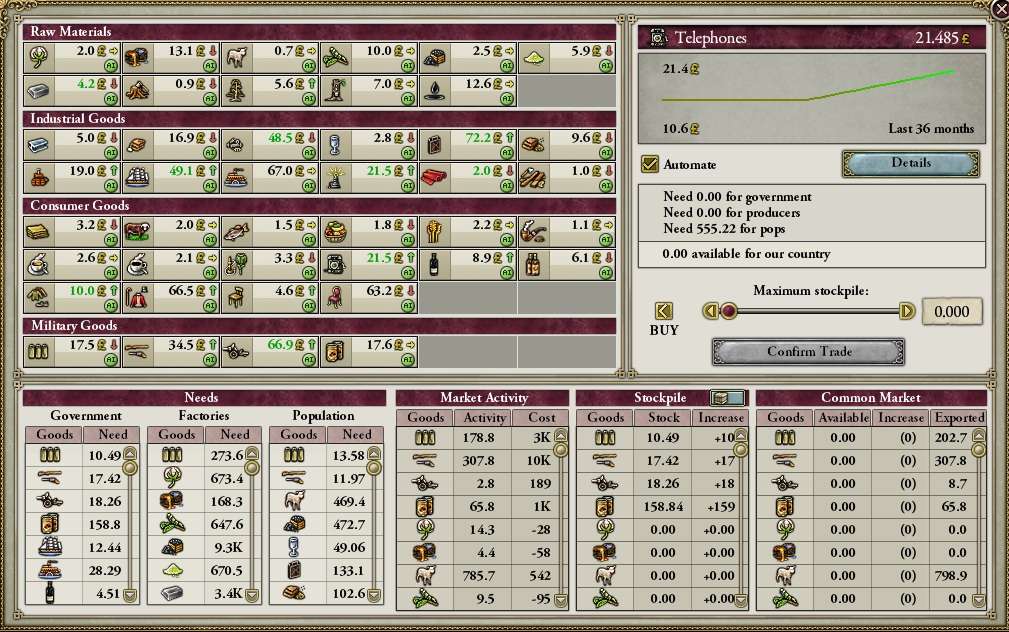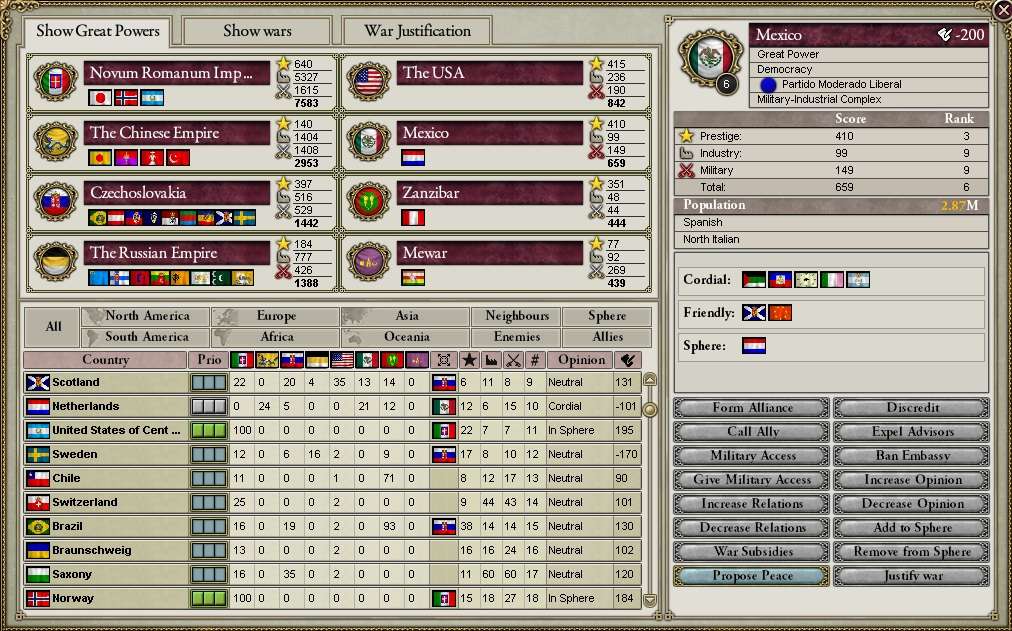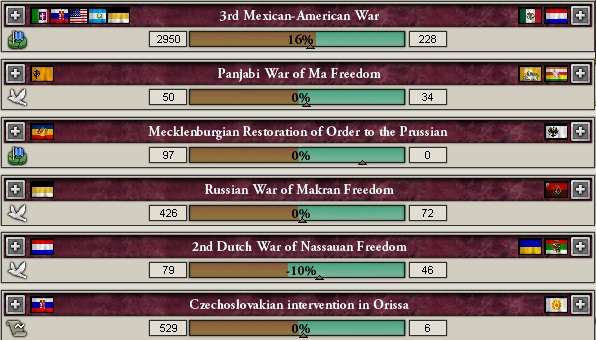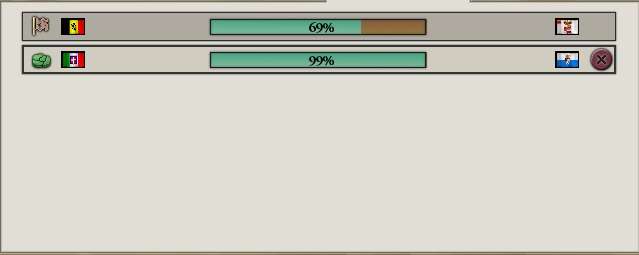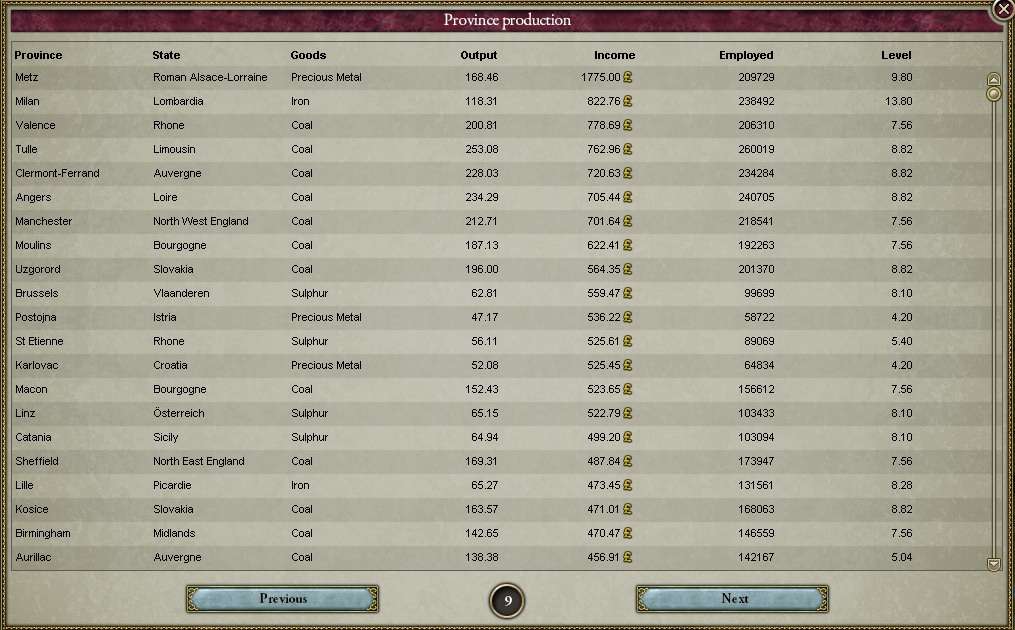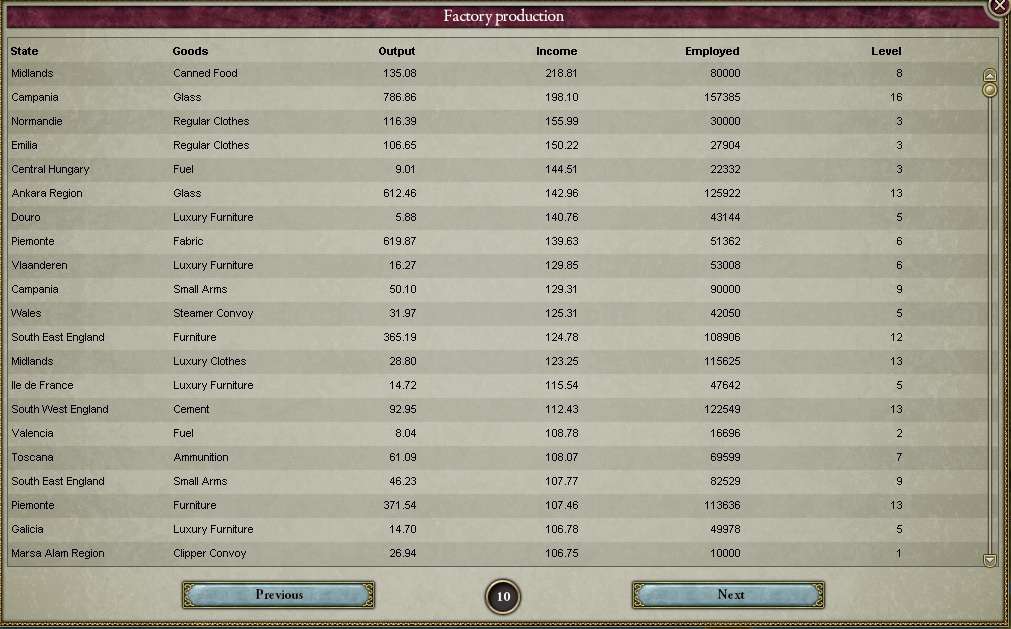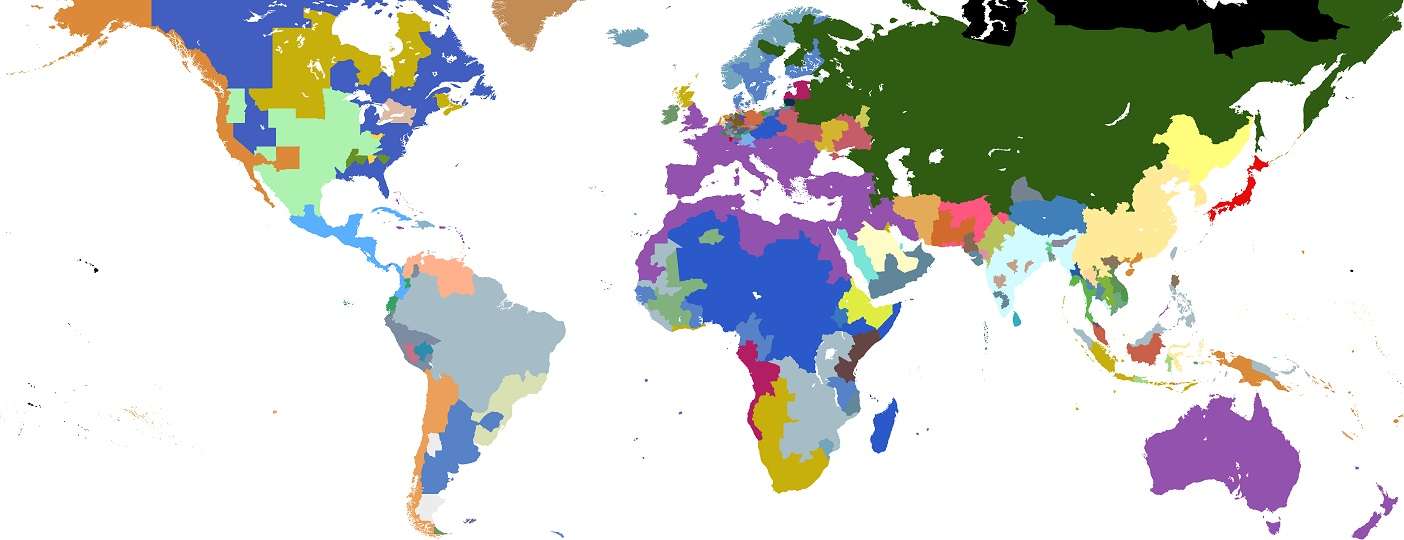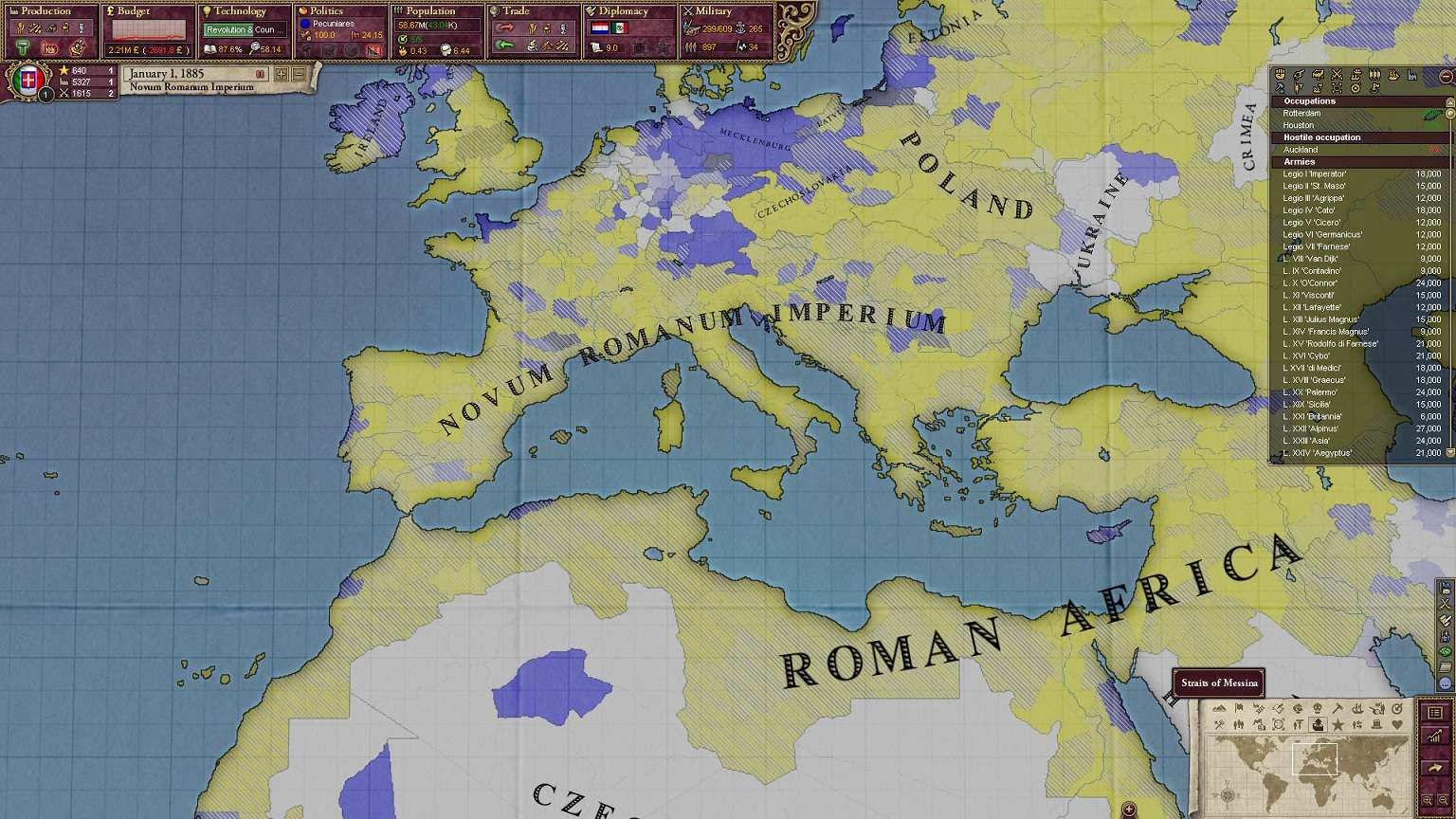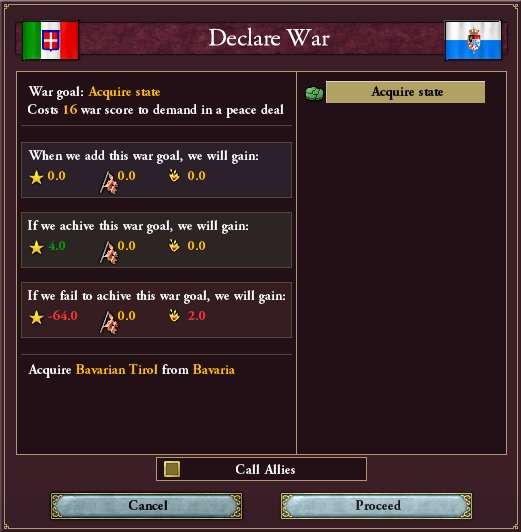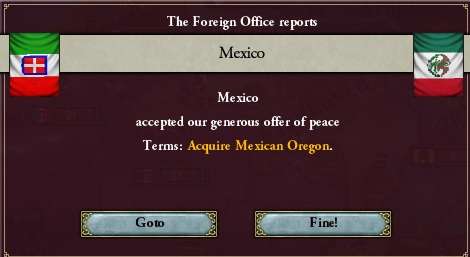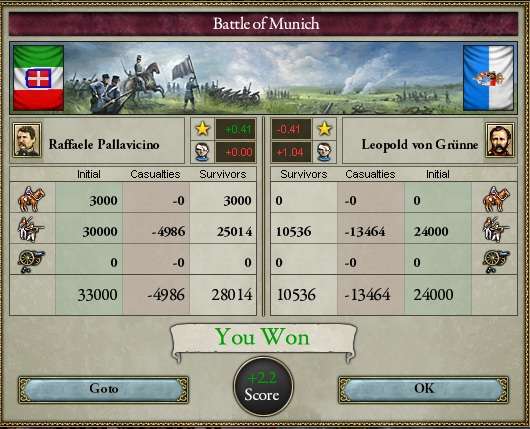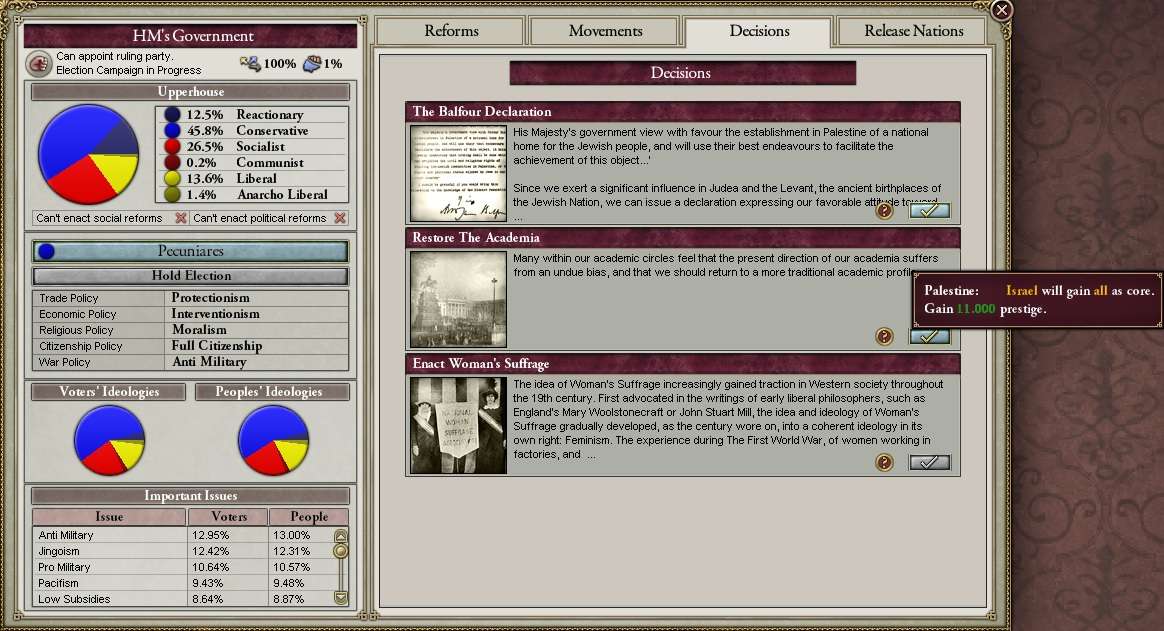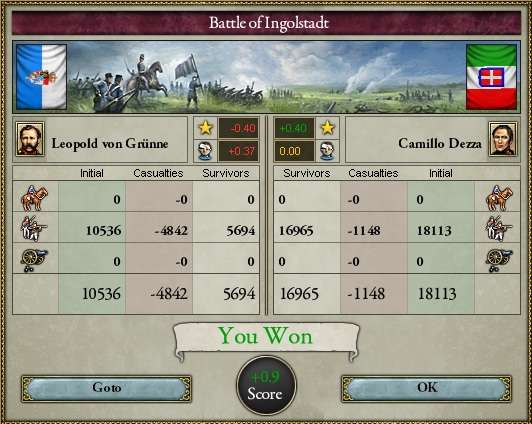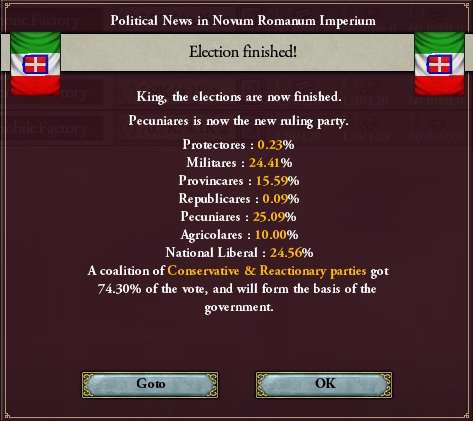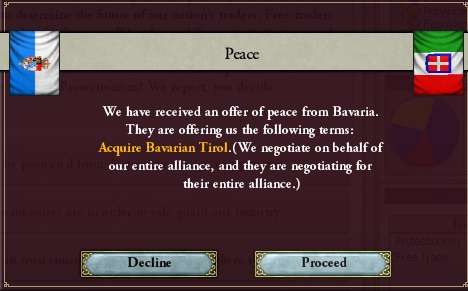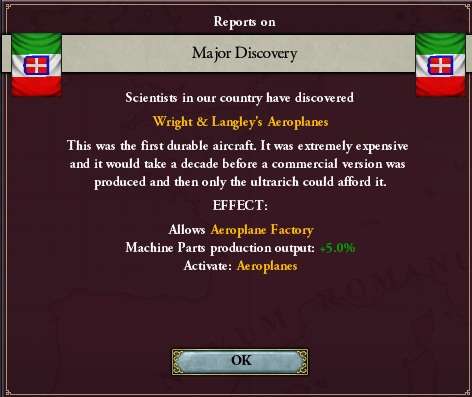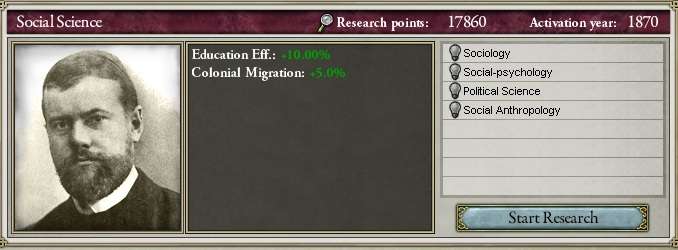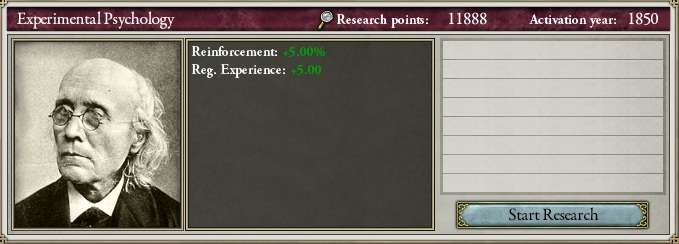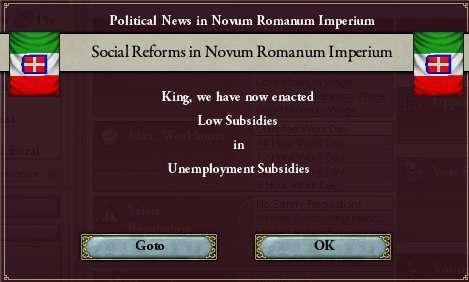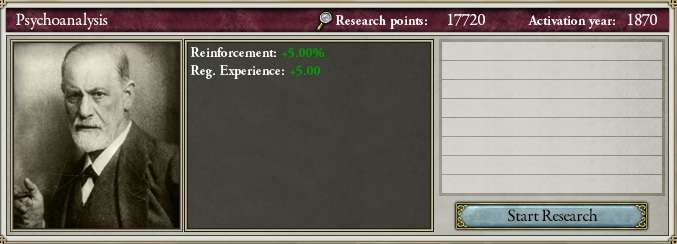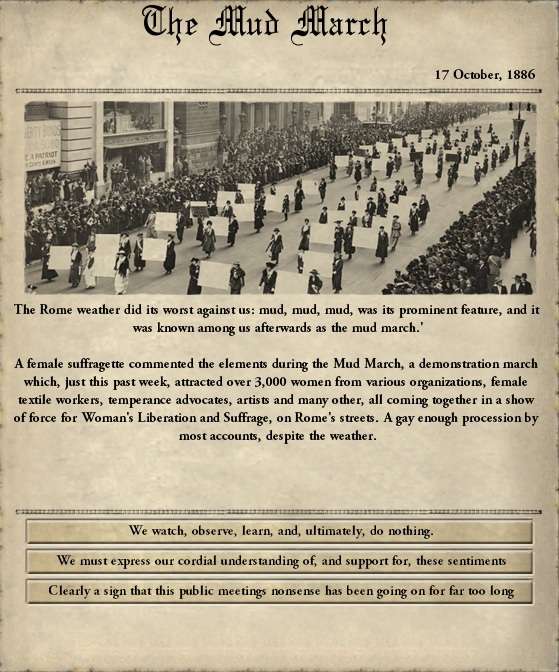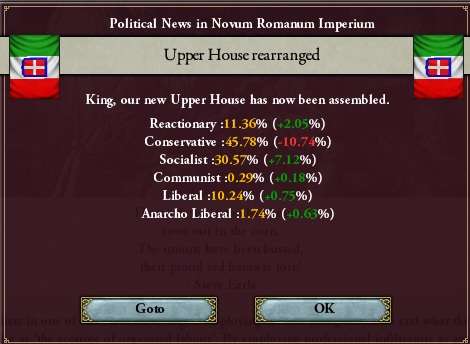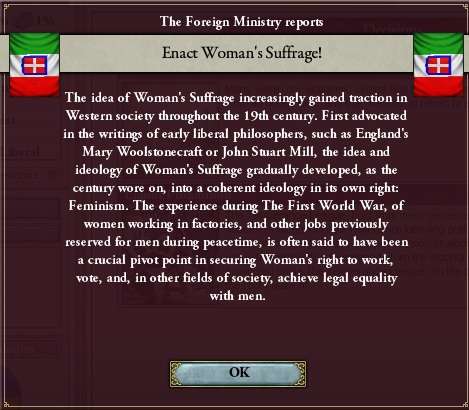Chapter 19: The years of progress
9 January 1885, office of the Chief of the General Staff, Florence
Paolo di Savoia carefully examined the roster of Generals. The war with Bavaria had technically already started, but only the recent news of Mexico's capitulation gave him the time he needed to work out a battle plan. Once again, the Foreign Ministry had gotten ahead of the legions.
His task, for the moment, was to appoint a General to command Roman forces against Bavaria. Umberto Giardino, the hero of the war against the Dutch, had been lightly wounded, so he was unable to participate. There were three notable Generals in theater: Raffaele Pallavicino, Camillo Dezza, and Carlo Baratieri. All three were experienced and capable soldiers. Dezza was easily the most aggressive; as a political appointee (the Dezzas were a very powerful family in Fiume), he also had the most influence. Pallavicino was a soldier's son, although his father had been a Sergeant. Baratieri's loyalties were... problematic. Baratieri was a registered member of the
Militares, but had a lot of friends that Minister O'Connor had identified as
Populares.
Of course, he had another option, although he personally disliked it: Arturo Orsatti. Orsatti was extremely junior on the list of Generals, but he had even more powerful friends than Dezza; namely, the Emperor and the Marshal. Marshal von Moltke could, if he wished, order di Savoia to appoint Orsatti. The German was a stickler for propriety, so he would leave the choice to his General, but if the Emperor demanded it? Helmuth would have no compunctions about overruling his subordinate.
Given his alternatives, di Savoia picked up his pencil and wrote "Dezza" in the command hierarchy. He would change it to "Orsatti" if he had to, but not if he could avoid it.
Little did he know that the events just a few miles away would take Orsatti out of the running.
-------------------------------------------------------------------------------------------------------
29 January 1885, home of Arturo Orsatti, Rome
Arturo Orsatti had held many jobs over his life, but this one was completely new to him and, he feared, beyond him. He'd begun his day as he had most other days; waiting for a new assignment. He'd called the Marshal -- all Generals in the legions had telephone lines in their homes -- every day for the past two weeks, but his status was still "pending." His one assignment since the end of the war with Mexico had been to attend Gabriele di Farnese's 17th birthday party. While he waited for his new duties, he scanned the daily reports. First among them was the Battle of Munich.
Arturo shook his head in disgust. Pallavicino was supposed to be smarter than that, yet his decision to keep his cavalry in reserve let the Bavarians ambush him. Yes, the General won the battle, but at a considerable cost. He picked up his pen and began to write a draft for the Marshal's desk when he heard a knock at the door. Orsatti opened it to find a very well dressed young man.
"May I help you, sir?"
The dapper gentlemen opened his briefcase. "Are you General Arturo Orsatti?"
Arturo nodded. "I am, sir. And you are?"
"Nathan Ledger. I'm an Australian attorney, from the firm of Wallace, Reynolds, and Ledger."
"I see. Do come in."
"Thank you, General."
Ledger removed his hat and sat down. Arturo took his own seat across from him. "What is this about?"
"General, did you know a woman named Caroline Sheridan?"
"I did. We dated for a while, but she lost interest after the Emperor's assassination. I haven't seen her since then."
"That was December 24, 1875?"
"Yes."
Ledger opened his jacket and his briefcase; he withdrew a pair of reading glasses from his pocket and took out a document from his briefcase. "Did you know Miss Sheridan passed away two weeks ago?"
Arturo blinked. He felt the beginnings of a tear from his left eye, but he wiped it away. "I... did not."
The attorney also looked pained. "Miss Sheridan was an employee at our firm, but she also had her will done with us. You are mentioned in it."
"How... how did she die?"
"She died in the recent flu epidemic. She left you a trust with specific instructions. If you would care to read it?"
Arturo nodded dumbly and took the document. There was a letter attached to the front page.
Dear Arturo,
I know we did not part on the best of terms. I told you that I could not take the horrors of Emperor Constantine's death, which was partially true, but only partially. Arturo, you were lost after his death. You had no real goals, no career, and no desire to better yourself. You were not the man I fell in love with, and a loveless home is no place to bring up a child. That is why I have raised our son, Antonio, myself. I know I am growing ill, and I have been keeping track of your career here in Sydney. You are well equipped to handle fatherhood, I think, and in any case you are his best hope. My parents are gone, and I was an only child, as you know.
Mr. Ledger is a good friend; he has been instructed to provide you with anything you require to raise our son. I am not a poor woman, and I leave all my worldly possessions to you, provided you do take care of our son. He is troubled. He has gotten in a number of fights at school, even as a nine year old. I think he will have your size; he is already five feet tall. Perhaps you can instruct him better than I.
I hope you can forgive me for keeping this from you. You are probably furious with me, and I do not blame you, but do not take it out on Antonio.
Love,
Caroline
Arturo was stunned, to say the least. "I have a son?"
"You do, General. We are staying in a hotel outside the city. Will you come and see him?"
"Yes, yes of course! Give me a moment to call the Marshal and inform him, then I will be happy to join you."
"Very well. I will wait outside."
For the first time in a while, Arturo Orsatti was glad that he was not in command of the war with Bavaria.
------------------------------------------------------------------------------
4 May 1885, Imperial Palace, Constantinople
Ever since he'd turned 16, Gabriele di Farnese had been Prince of Constantinople. This decision was not an easy for Trajan III, but with his own son being 12, somebody had to be the Heir to the Throne. That somebody, at least for the time being, was his nephew, Gabriele.
Trajan didn't really understand his nephew. Gabriele had grown up in an extremely chaotic environment. Unlike his older brother, Ferdinand, Gabriele was pale and sickly. That might have been why Sylvia Robespierre -- aka Laura Datti -- took so little interest in her younger son. Ferdinand was going to be Emperor one day, she thought, and more importantly, lead the Jacobins to victory. By the time Gabriele developed his own political philosophy, his mother, father, and brother were long gone. He didn't share his brother and mother's sympathies with the Jacobins -- for which Trajan was profoundly grateful -- but neither did he seem to have any real interest in ruling the Empire. Trajan had tried to get him interested in politics, at least to attend a meeting of the Senate in Rome, but Gabriele had always refused.
Trajan III sighed as he sat, alone, in the smaller palace the Farneses had built in Constantinople. He was technically in his nephew's room, but since the Emperor and his court were in the Second City of the Empire for political reasons, Gabriele had graciously yielded the room to his uncle. Trajan's immediate concern was the so-called "Balfour Declaration." Arthur James Balfour, the scion of a wealthy family of
Protectores, had been appointed as Mayor of Jerusalem. The Emperor had hoped that the relatively easy post would be a sinecure for Balfour; instead, Balfour promised the Jews of the city their own state.
The Emperor, while privately furious, had to admit that there was little he could do. The damage was done. Trajan III, therefore, decided to sign the declaration and create 'Israel' as an autonomous
provincia, but firmly within the auspices of the Empire. They were not independent, but were given self-rule. The Mayor of Jerusalem was proclaimed the Governor of Israel (as well as Senator) and freely elected by his constituents. This neatly gave Trajan an excuse to fire the bumbling idiot who got him in the mess. The Jews of the city and
provincia were pleased, defusing the potential catastrophe. With the disaster averted, and success in Bavaria, Trajan decided to take a couple of weeks to visit with his nephew and presumptive heir.
When Gabriele walked into the throne room, he was holding a somewhat dated report from the Battle of Ingolstadt.
The Emperor looked confused. "Gabriele, where did you get that?"
The Prince grinned briefly. "I am the Heir to the Throne, Uncle. I was acquainting myself with my future realm."
"You've not once shown an interest in your duties before, Gabriele. You've been a capable administrator here, but you've shown no interest in Rome."
"That is true, Uncle. I would like to correct that deficiency in my education."
"Very well. What else have you been examining?"
Gabriele showed his Uncle an Imperial Charter for the city of Manchester. "What does this mean?"
"Ah. Slovakia has been designated an official supplier for government telephones; it is an Imperial Focal Point. They are also authorized to develop Electric Gear and, if the technology is ever finished, Radios."
"I see. Why Slovakia?"
"Tesla has one of his largest and most productive labs there, so they can take advantage of any new developments."
Gabriele nodded. "I have another question. Do you want me to be your Heir?"
If Trajan was confused before, now he was positively stunned. "Why would you ask that?"
"Is it not natural to see your own son succeed you in your position? You have been very kind to me, Uncle, but my family is hardly without a certain... reputation."
"Tell me you are no Jacobin?!"
Gabriele laughed softly. "Of course not. The bastards killed my father and warped my mother. An Empire without an Emperor is unthinkable! We would surely collapse."
"I agree, of course, but why ask this now?"
"I wish to make my own way in the world."
Trajan looked at his nephew with newly found respect. "I can certainly respect that. What did you have in mind?"
"Well, I am young and fit. I have overcome most of my childhood illnesses, but the only way to truly show I am worthy of my station is to prove myself in a difficult situation. I am told that the legions are the true birthplace of our greatest men. Is that not so?"
Trajan nodded. "Yes; many of our most outstanding heroes have been soldiers. I am pleased you wish to pursue this path, but what of your duties as Prince?"
Gabriele handed his uncle a document. "I am abdicating my right to succeed you, sir. I will serve as Regent in name only, until your son can claim his rightful place."
"Are you certain? If you relinquish your claim to the throne, you can never regain it."
"I am sure."
"Then I relieve you of your duties. I will personally grant you a commission --"
"No, Uncle. I want to do it properly. I will enlist as a Private in the legions. I want no assistance of any kind from you. I will make my own path."
Trajan nodded, and overcome with emotion, hugged his nephew. "You are a good man, Gabriele, and I am certain you will make a good soldier. I will do as you ask."
---------------------------------------------------------------------------------------
4 November 1885, office of the Chancellor, Rome
Benjamin Disraeli and his cabinet shared a glass of champagne as the new election results came in; the
Pecuniares had a secure hold on the Chancellery, which meant that all of his ministers would keep their seats. Disraeli had even grown to tolerate Eduard Bernstein, something he thought was impossible.
They had three things to thank for their victory. The first was Bavaria's surrender.
The region annexed, Bavarian Tirol, was neither large nor particularly wealthy, but a clear and decisive victory took some of the wind out of the sails of the National Liberals. Cecil Rhodes himself visited the region shortly after conquest, delighted to see true evidence of the might of Rome. That the casualties had been very high, even disproportionately so, escaped the notice of those distinguished gentlemen.
Their second achievement, or at least an achievement they claimed credit for, were the inventions that swept the Empire. The light bulb (invented by Tesla), the airplane (invented by the Wright brothers; Americans, but Americans who had designed their invention while vacationing in Rome), and the automobile (invented by Roman citizen Gottlieb Daimler) all promised to transform society, and the Emperor himself, as always, showed the way. He owned the first airplane, the first automobile, and even used Tesla's light bulbs to illuminate every building in Rome.
The new devices were supported by further Imperial Focal Grants; Birmingham became the center of Roman Automotive work, while a new contract in Electrical industries was given to Naples. These new inventions earned the support of factory workers and capitalists alike. The final ingredient was aimed at the increasingly radical intellectuals: a new center for Social Science, based in Rome.
Rome was more prosperous than ever, and the ruling coalition was granted its highest vote total in years. Disraeli could take justifiable pride in his work.
---------------------------------------------------------------------------------------------
23 May 1886, the deck of the Marco Polo, Faro, Hispania
Captain Nikolai Alekseyev couldn't help but gape in awe at how
shiny everything looked. His Cruiser, the
Marco Polo, was to him the most beautiful thing in the world. It was as much his child as if his wife had given birth to it. Admiral Ruggiero Baldiserra had designated the
General Garibaldi as his flagship, but only because he was distantly related to that virtual non-entity. To Nikolai, it didn't get any better than old
Marco.
Nikolai grinned like a loon at his executive officer, Commander Carlo Battista. Carlo was chosen for his command for two reasons. First, of course, he was an exceptional naval officer. Nobody on the
Marco Polo was second-rate; even the lowliest seaman had been carefully chosen by Alekseyev and Battista. The second reason was Nikolai's missing leg; Carlo would be Nikolai's eyes and ears while the Captain remained in his cabin as often as possible. Without the Captain's popularity throughout the Empire, he'd probably be sailing a desk instead of his new ship, so Alekseyev didn't grumble about the arrangement too much. Nikolai's only complaint about his XO was Carlo's near obsession with the newest intellectual fad (as the Captain saw it); Experimental Psychology.
Alekseyev tolerated this, but barely. Even worse, his navigation officer, a native of Suakin, was a devotee of rubber and its many, many uses.
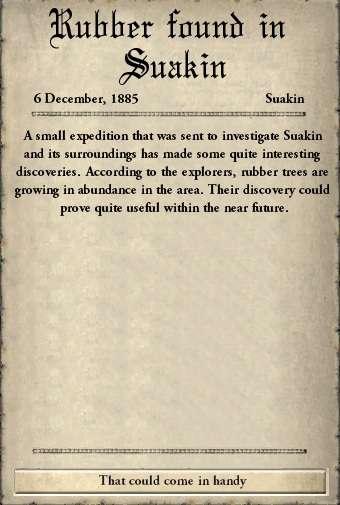
The Captain good-naturedly threatened to pitch them both overboard on more than one occasion, but didn't really mean it. Only one thing spoiled his mood: he'd been told by the Admiral that this was going to be his final ship command as a Captain. The Admiral had thought he was doing his Captain a favor; a promotion to Commodore, which Nikolai would receive upon his return to the shore, was evidence of extreme confidence in an officer's skill. It was only one step to Admiral from there. Unfortunately, the rank's meaning had changed over time. In ancient days, Commodores had been trusted with squadrons of ships. Not full fleets, but squadrons, principally tasked to disrupting piracy. In the modern Roman fleet, there were more Admirals than fleets, so even squadrons were given to Admirals. Commodores had become, in essence, staff officers. Nikolai found it hard to believe that Commodores would ever be given an important assignment at sea.
What kind of ship would be so powerful, so awe inspiring, that a mere Captain couldn't command it?
-----------------------------------------------------------------------------------------------------
3 January 1887, the Imperial Senate, Rome
When Benjamin Disraeli attended this meeting of the Senate, he'd expected another boring presentation from his Deputy, Iosif Stavros. Stavros was always calling meetings, which was his right as Deputy Chancellor, but doing so out of session. His last "emergency session" increased unemployment subsidies for all Romans by 25%.
Eduard Bernstein was equally irritating, forcing the continued (foolish, in Disraeli's opinion) funding of this psychology nonsense he was so keen on.
Bernstein's project was symbolized by this crazy Viennese fruit cake who was always bothering people about their dreams. Disraeli found it unseemly and distasteful in the extreme, but the people of Rome ate it up. Still, the Chancellor was fine with diverting a little cash to shutting up the Socialists. Rome wouldn't be crippled by it, and it was worth the price.
Then a funny little march got all of Rome in an uproar.
For some time, Roman women had been quietly agitating for the right to vote. It had been a pet cause of Karl Marx's for a long time, but the movement never really had a leader. Kathleen O'Connor was an incredibly powerful female figure, but that paradoxically prevented women, as a group, from gaining power. Kathleen was so powerful that she was safely discarded as an anomaly. The other powerful women in Roman history tended to be terrifying specters, like Sylvia Robespierre, or competent but politically neutral officials, like Caroline Sheridan. Empresses had typically shied away from politics -- although Empress Charlotte had been gone a very long time, the memory of Rome was even longer. Two organizations had had dynamic female leaders, but one was the Jacobins. The other was even worse.
The
Populares.
It was originally thought that the
Agricolares were behind the so-called "mud march." They'd been vocal about women's suffrage. Both Stavros and Bernstein had introduced bills in the Senate to grant women the right to vote, but it was firmly voted down by men like Disraeli, who felt that giving Roman women political power would distract them from their duties at home. Yet when the
Red Star applauded the march, Stavros had never heard of the author, nor had he even approved the article. The author had signed their name only
Femina. Only the
Populares still used pseudonyms.
The Roman response had been to do nothing. Bismarck, normally less reactionary than his faction, actually wanted public meetings banned. Bernstein and Stavros wanted to applaud the march, even give it support by the government. The cabinet took a vote. Bismarck was voted down unanimously, since Bismarck refused to vote for his own proposals unless there was a tie. That left two options: support or Disraeli's proposal, which was to offer neither recognition nor censure. Disraeli won, four votes to two (Bismarck, Disraeli, Rhodes, and O'Connor vs. Bernstein and Stavros). All five asked James O'Connor, as Minister of Security, to figure out who
La Femina was.
That proved to be nearly impossible. O'Connor's investigations had pinpointed five leaders of the
Populares. They chose an old name for their little group: the Society of Cincinnatus. The Society had, since time immemorial, defended the institutions of the Empire against all enemies. Unfortunately, the Society was perverted over time, and ultimately destroyed in the beginning of the 18th century. Simply calling themselves the Society forever branded the leaders of the
Populares as traitors. No Emperor would ever defend them or even allow their existence. The Minister of Security had identified the pseudonyms:
Femina (the woman); "Miguel"; "Lazarus"; "The Genius"; and
Squalus (the shark). That was about all they had. Somehow, the Society had all acquired telephones or at least access to them, which meant that they didn't have to meet in person. The Ministry had intercepted messages, but only a few, and none more than two or three words long. That meant they were using some sort of code, a code that was as yet unbreakable.
No matter who had organized the march, or why, the effect was clear: a huge upswing for the Socialists in the election of 1887.
The Socialists, Communists, Liberals, and Anarcho Liberals between them held 43 Senators. The Reactionaries were firmly opposed to such a vote, and they controlled 11 Senators. If 8 of the 46 Conservative Senators joined the Suffragists, it would pass. Disraeli knew he was defending all that was decent in the Roman Empire. It not only benefited men, but women, that women could not vote. Women could be above politics, to provide healthy role models for children. He'd spoken on the subject several times. He knew that the
Militares, especially Moltke, would probably stick by him. That left the National Liberals. To Disraeli's horror, the first man to vote "Aye" from the conservatives was General Arturo Orsatti. Three more soldiers, either friends or proteges of Orsatti, joined him.
46 for to 41 against, Disraeli whispered to himself. All the
Pecuniares had followed Disraeli's lead, as had most of the
Militares. There were 12 Senators left. Cecil Rhodes and four of his supporters stood to vote "No."
46 to 46. Edward Vickers' son, Thomas, chewed his lip for a few moments before also voting no.
46 to 47! Disraeli's greatest fear was a tie; Stavros could vote in that scenario, and he would assuredly vote for the bill's passage. Disraeli himself could not vote at all, as he was not legally a Senator -- as Chancellor, he was a member of the Curia.
The remaining uncounted Senators looked nervously around the chamber. All eyes were on them. Stavros stood serenely at the podium. Of the six other Senators, two were away: Nikolai Alekseyev was away at sea, the sole Senator in the Imperial Fleet, and the Governor of Israel, while still technically a Senator, never attended votes. That left four. Disraeli was at first elated when one of them rose confidently and proclaimed "No!" Then he realized who had said it: General Pallavicino. Pallavicino was called the "Butcher of Munich" for the horrific casualties on both sides in that battle. Disraeli liked the General, and knew it wasn't his fault that so many Romans had died. The Bavarians had developed their own machine gun, and only General Orsatti had ever come up with tactics to combat it; tactics that di Savoia's opposition had denied.
The remaining three voters, two Colonels and a Centurion, had all participated in that same battle, and seen men die for no good reason. All three, whatever their personal political opinions, would never support Pallavicino.
"Aye!"
Disraeli slumped in his seat. 49 to 48. Stavros didn't need to vote. He'd won.
---------------------------------------------------------------------------------------------
A long delay, I know. The next one might be even longer; we're going to be moving at the end of next week, or possibly earlier. That may mean no internet for a while; we'll just have to see. (For those curious, I'm still going to be in the same city, just a different apartment).




